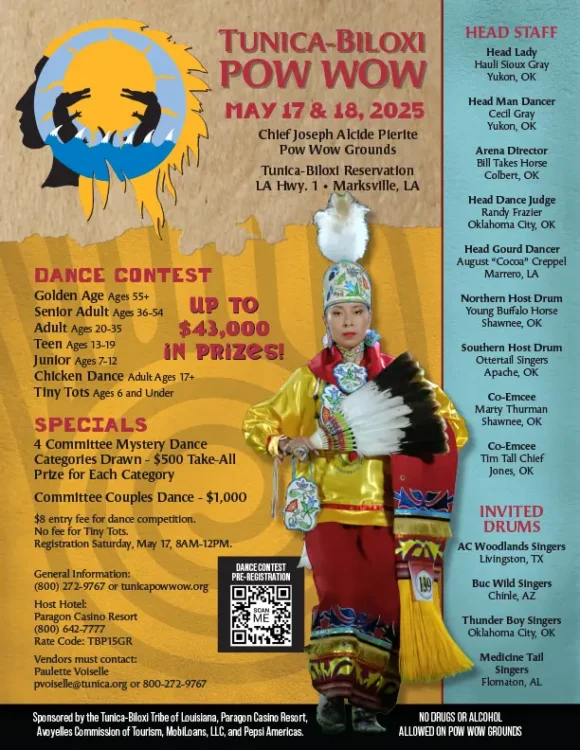Tunica-Biloxi Tribe of Louisiana Revives Native American Sporting Tradition with Southeast Stickball Clinic & Exhibition Feb. 6
Marksville, La. – (Jan. 20, 2016) The Tunica-Biloxi Tribe of Louisiana’s Language and Culture Revitalization Program (LCRP) will host a free Stickball Clinic &
Exhibition on Saturday, Feb. 6 for boys and girls ages 10 – 16. Funded in part by the National Parks Service Lower Mississippi Delta Region Initiative, the workshop is open to members of regional tribal communities in Louisiana, Texas, and Mississippi.

The clinic and exhibition will be held from 9 a.m. to 1 p.m., at the Chief Joseph A. Pierite Pow Wow Grounds on the Tunica-Biloxi Reservation, near Marksville, Louisiana.
The one-day workshop will include a free clinic led by skillful players from the Alabama-Coushatta (AC) stickball team of Livingston, Texas – Troy and Krista Langley. The players will teach participants basic skills, rules and the safety of the game. The AC team will play an exhibition game and then support workshop participants in scrimmage games. The LCRP will host a cookout for all participants following the stickball clinic and exhibition games.
One of the oldest team sports in North America, Native American stickball or “punatarahpani” (in the Tunica language) was especially popular among Southeastern Indian tribes, including the Tunica-Biloxi. Stickball was played by tribal members regularly throughout the mid-20th century and gradually disappeared. Nonetheless, Choctaw communities in Mississippi, Coushatta in Louisiana, and the Alabama-Coushatta of Texas still have active stickball programs.
At its peak, stickball was played by all age groups – children, youth and adults. Additionally, it served as more than means of entertainment, it built body and spirit through exercise. Many games have roots in ancestral tests of strength and sport that reinforced group cooperation and sharpened survival skills in often hostile environments. For warriors, the games helped maintain their readiness and combat skills between times of war. The gradual shift to a more sedentary lifestyle has highlighted the need to reawaken interest in physical activity, especially among Native youth.

As the Tunica-Biloxi strives to preserve and revitalize traditional ways of life, it is necessary to provide community educational forums that will perpetuate knowledge and usage of these cultural elements. The Stickball Clinic & Exhibition provides an opportunity to explore unique traditions to be shared by neighboring indigenous communities. Through the clinic and exhibition, the Tunica-Biloxi Tribe of Louisiana and its Language and Culture Revitalization Program hopes stickball can become an important part of improving the health and well-being of the Tunica-Biloxi people once again.
Participants must pre-register for the Tunica-Biloxi Tribe of Louisiana’s Stickball Clinic and Exhibition by contacting Ryan Lopez at rlopez@tunica.org or (800) 272-9767, ext. 6433; space is limited. Parent(s) must accompany children participating in the workshop.
About the Tunica-Biloxi Tribe
The Tunica-Biloxi people first appeared in the Mississippi Valley. In the late 1700s, they settled near Marksville, where they were skilled traders and entrepreneurs. Today, the Tribe has more than 1,200 members throughout the United States, primarily in Louisiana, Texas and Illinois.
The Tunica-Biloxi Tribe received federal recognition in 1981 for its reservation within the boundaries of Louisiana. The tribe owns and operates the Paragon Casino Resort, the largest employer in Central Louisiana. Through its compact, negotiated by the late Tribal Chairman Earl J. Barbry, Sr. and the State of Louisiana, the Tribe has been able to assist local governments in the area with its quarterly distribution of funds, totaling more than $40 million over two decades. For more information about the Tunica-Biloxi Tribe of Louisiana, visit www.tunica.org.
